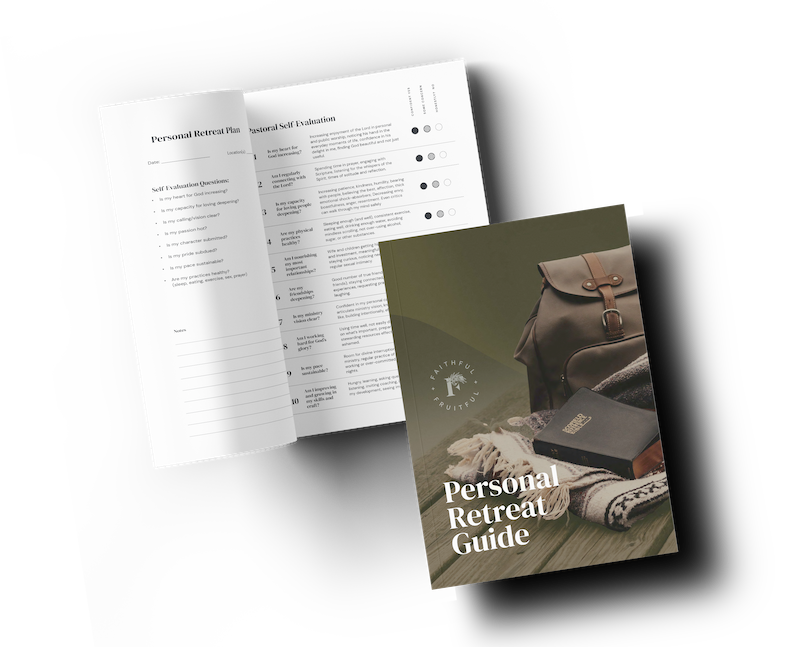Taking a sabbatical in the summer of 2015 was one of the sweetest experiences of my life and my family’s life together. It was a tremendous gift to my ministry and, I believe, to our church. I believe it was key in preparing me for an important season of leadership, and I think it demonstrated clearly that our church was not a one-man show.
Many pastors ask about my experience, and this document explains some recommendations. This isn’t law, but merely advice that comes out of my experiences.
1. Be Proactive
If possible, be proactive about a sabbatical. Often sabbaticals are last-ditch efforts to prevent burnout or quitting. But the best sabbaticals are intentional and proactive efforts to provide rest and replenishment.
2. Communicate Well
Communicate to the church well in advance about the sabbatical. My sabbatical began in May and we communicated about it in January. This avoided any rumors or speculation as to the reason for it, and allowed the church to be more supportive.
3. Opportunity for Discovery
While it is true that having healthy sabbath and personal care rhythms prevents the need for a sabbatical, I found that there were key lessons that could have only been learned through an extended time away. For me, sabbatical provided not only much needed rest, but also the ability to know myself in a new way that significantly improved my leadership.
4. Sabbatical Length
My sabbatical was 10 weeks, which is about the shortest that I would recommend. Crosspoint Ministry, who coaches and guides pastors through sabbaticals, recommends at least three months, but no longer than six. Many of the most valuable lessons for me came after the four week mark.
5. Wisdom In Counseling
If it were up to me, I would require that anyone taking a sabbatical get some kind of formal counseling through the experience. I used Crosspoint, who specialize in sabbatical counseling. Having a wise person to guide me and help me reflect throughout the experience was invaluable. This is worth the church investing in to help maximize the value of the sabbatical for the pastor.
6. Connect and Disconnect
I would recommend that the purpose of the sabbatical be to have rest and replenishment and that all kinds of ministry-related productivity be not allowed. For me, it was not a study break or a writing leave. It was not a time to attend conferences or network with other church leaders. I read books that were fun (a number of novels and historical books) and spiritually replenishing (books that I needed for my soul). I took up a new skill (rollerblading), and leaned into some hobbies that I find refreshing (cooking, exercise). It’s just too easy to fall into “work mode” if you let yourself.
7. Who Is This Sabbatical For?
Determine whether this is a sabbatical for you or a sabbatical for you and your family. Each situation is different, so there’s no right answer. In our case, we wanted it to feel like a sabbatical for our family, which changed the way we structured our days and activities.
8. Daily Schedule
Work with your spouse to determine what you want the flow of a typical day to be. Zero structure over an extended time is anarchy, and can leave you more restless and anxious than rested. We broke the day up into three big chunks: morning, afternoon, and evening. We made a kind of flow for what would typically happen in those chunks. Of course, there were days we deviated from the plan and were flexible, but having at least some macro-structure was helpful.
9. Sabbatical Location
If possible, get to a new location for as much of the time as possible. This can be tricky depending on kids’ school and stage of life, but do what you can to maximize time away. For me, being home would mean running into a lot of people, wondering more about what was happening at church, and being drawn into conversations that put me back in ministry mode. This requires money, of course. We saved a few thousand dollars leading up to the experience and the church graciously gave us additional funds to allow us to leave town for nearly all of the ten weeks.
10. First and Last Week
Make the first week and the last week more active and busy than the others. You need time to emotionally wind down and then ramp back up. Going from a full-sprint to a full-stop is too jarring for your system. For us, the first week was going to a family wedding and then visiting an amusement park, while the last week was doing a lot of activities with my parents in Colorado. We had a number of fun excursions in between, but were mostly able to settle into a slower pace and rhythm that was truly restful and refreshing.
11. Weekly Examples
Here’s what it specifically looked like:
- Week 1: Drive to Nashville for family wedding, then Toledo and visit Cedar Point.
- Weeks 2-5: Stay in Toledo at a VRBO (near Molly’s family). This allowed us to spend lots of time with family, but still have our own space and be able to better dictate our pace.
- Weeks 6-8: Drive to Silverthorne, CO and stay at a friend’s mountain home for a few weeks, just by ourselves. This was probably the most refreshing time.
- Weeks 9-10: Go to Denver to visit my parents and then drive home to AZ.
12. Get Over Guilt
As fast as possible, get over the guilt of taking a sabbatical. A few church members won’t like it and will feel that it’s not fair because they don’t get one in their jobs. You’ll likely feel the same way — “Why should I have this awesome gift when others don’t get one?” Get over it. Those who have allowed it to happen have done so because they want it for you and want you to enjoy it.
13. Don’t Compete
Don’t try to win at taking a sabbatical. Because of the guilt feelings, your desire to honor the gift, and (most likely) your internal competitive motor that makes you a good leader, you will feel tempted to succeed at doing a sabbatical. This is not the right mindset. Take to heart that just like “the Sabbath was made for man, not man for the Sabbath” (Mark 2:27), this sabbatical is a gift to you that’s for you. It’s not a pressure-situation to achieve success. It’s a gift to be received with gratitude and joy.
14. Flinch Towards “Yes”
Flinch toward “yes” throughout the experience. You may not get another experience like this, so make the most of it. If you get an opportunity to do something fun, take it. If your kids ask you to try something, try it. Even if you have to spend more money than you planned, do it. We determined that we were going to have a great experience and we weren’t going to focus on limitations.
15. Away Messages and Automatic Filters
Take a scorched-earth approach to your email so that you can return and not have to manage email. I set up an automatic filter in Gmail that would mark-as-read and archive every single email that came in, allowing me to come back after ten weeks with an empty email inbox. Each email received this auto-reply:
I’m currently on Sabbatical until July 20. I’m offline during this time and all emails received will be automatically deleted. If you send me a message during this period, I will never receive it and never respond to it. Sorry.
Here’s what you can do in the meantime:
(1) If this is an emergency, you really should stop emailing and call 9-1-1.
(2) If it’s an urgent ministry matter, you can call the church office at 480-553-8295.
(3) If it’s a cute forward (Dad), then know that I’m sure I would have loved it.
(4) If it’s something that you think really does need my attention or a response, please resend it after July 20.
I hope you’re having a marvelous day. Thanks for understanding.
Luke
16. Terms for Contact
Similarly, you want to avoid being contacted about ministry decisions or issues from your staff or elders. I told our team to use their discernment about whether there was something that they thought I would want to know, but to default toward keeping me out of everything. The only time they contacted me was when a man in our church passed away and they thought I’d want to know.
17. Interim Leader
Put one key person in charge during your time away. Lots of roles may need to be restructured while you’re away (you’ll find that many of them don’t need to come back to you once you return), but create a clear chain of command for decisions and communication.
18. Clear Expectations
Create clear expectations for your return. Plan on gently wading back into the pool rather than doing a cannonball back in. You must prepare your key leaders that even after you return, you will be easing back in. These folks will have been carrying an extra load in your place and will be eager to hand it back to you. But they need to prepare for a gradual handoff.
19. Care for Staff
Expect that those who carried your load during sabbatical may need some extra vacation or rest in the months after your return. Especially if people have carried responsibilities that are outside of their primary giftings, it will drain them. Be patient and generous with these key people.
20. About Social Media
Step away from social media during the sabbatical. This is a no-brainer, but do it. The easiest way is to delete it from your phone.
21. About Attending Church
Be thoughtful about attending church during your sabbatical. On one hand, it’s good for you and your family to be able to attend worship services with zero responsibility. It’s good to be a normal person and sit under the word. But on the other hand, it can be very hard to turn off your “what would I do” brain at other churches. When we were with extended family, we attended church with them. The other Sundays we went to church a few times and stayed home a few times. God used one service at a church in Colorado to really speak and minister to me in a significant way. This should not need to be said, but if you are in town, do not attend your own church.
22. “Report” On Your Sabbatical
When you return, plan on doing a special sermon along the lines of “What I Learned on My Sabbatical.” This will allow you to give one big update to a bunch of people, rather than having a thousand of the same conversation. While you’re away, don’t sweat this sermon. As you get closer to returning, gather your thoughts and takeaways. You can watch or listen to my sermon here.
23. Patience
Be patient with yourself and others. You may have a transformative experience that others did not have. You will likely learn things about yourself and consider changes that you want to make. These will take time and buy-in to enact, and you should be patient with the people who allowed you to have this experience and who carried the load while you were away.

